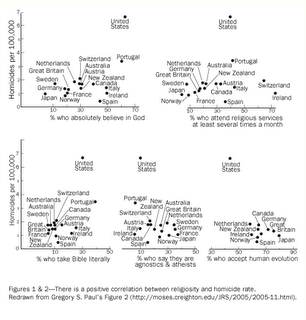 Most people (with the exception of Elton John) would likely subscribe to the notion that religion, of and by itself, serves an important function in society. To be good one must be moral and to be moral one must be religious.
Most people (with the exception of Elton John) would likely subscribe to the notion that religion, of and by itself, serves an important function in society. To be good one must be moral and to be moral one must be religious. As it turns out, that isn’t necessarily so. Matthew Provonsha reviews a study by Gregory Paul examining the various societal dysfunctions with different measures of religiosity. Comparing countries to each other, secular societies seem to suffer homicide, abortion, teenage pregnancy, etc. less than more religious ones – particularly the United States.
Matthew Provonsha in Skeptic magazine:
You may read the entire article here.It is commonly held that religion makes people more just, compassionate, and moral, but a new study suggests that the data belie that assumption. In fact, at first glance it would seem, religion has the opposite effect….
Paul begins by explaining how far his findings diverge from common assumptions. He even quotes Benjamin Franklin and Dostoevsky to show how old these common-misconceptions are. Dostoevsky wrote, “if God does not exist, then everything is permissible.” Benjamin Franklin noted, “religion will be a powerful regulator of our actions, give us peace and tranquility within our minds, and render us benevolent, useful and beneficial to others.”
To this day, the belief that religiosity is socially beneficial is widespread in America, especially amongst politicians, as Paul notes: “The current [at that time] House majority leader T. DeLay contends that high crime rates and tragedies like the Columbine assault will continue as long schools teach children ‘that they are nothing but glorified apes who have evolutionized [sic] out of some primordial soup of mud.’” … Surveys show that many Americans agree “their church-going nation is an exceptional, God blessed, ‘shining city on the hill’ that stands as an impressive example for an increasingly skeptical world. ”This assumption flies in the face of the actual statistical evidence that Paul examined.
***
The United States is a strong exception, experiencing far higher rates of homicide than even (strongly theistic) Portugal, while Portugal itself is beset by much more homicide than the secular developed democracies. Hardly a “shining city on a hill” to the rest of the world, Paul writes that, “The most theistic prosperous democracy, the U.S., is exceptional, but not in the manner Franklin predicted. The United States is almost always the most dysfunctional of the developed democracies, sometimes spectacularly so, and almost always scores poorly.” This deviates immensely from what most Americans consider to be common wisdom: that religion is beneficial. “But in the other developed democracies religiosity continues to decline precipitously and avowed atheists often win high office, even as clergies warn about adverse societal consequences if a revival of creator belief does not occur.”
Despite the best efforts of “pro-life” Americans, abortion rates are much higher in our Christian nation, and lowest in relatively secular ones such as Japan, France, and the Scandinavian countries (Figures 3 and 4). In general, higher rates of belief in and worship of a creator correlate with higher rates of homicide, juvenile and early adult mortality, STD infection rates, teen pregnancy, and abortion in the prosperous democracies (Figures 5 and 6). This would seem to indicate that there is a positive correlation between religiosity and dysfunctionality, but what does that mean?
The question is one of causation, and there is no clear answer. Whether religion leads directly to dysfunctionality, or religions merely flourish in dysfunctional societies, neither conclusion from this study flatters religion. The first tells us that religion is a hindrance to the development of moral character, and the second that religion hinders progress by distracting us from our troubles (with imaginary solutions to real problems). This study is complicated enough that I do not think that we can draw definitive negative conclusions about religion. But we can at least conclude, contrary to popular belief in this country, that it is not a given that religious societies are better, healthier, or more moral. What we can be clear about from this study is that highly religious societies can be dysfunctional, whereas by comparison secular societies in which evolution is largely accepted display real social cohesion and societal well-being. As is always the case in science, more data
and additional research will help clarify our conclusions.
1 comment:
Unfortunately, I suspect that religion, like nationalism and other "isms" too often encourages individuals to not think for themselves - to not determine what their values and beliefs actually are. People will, in many cases, lay the ultimate responsibility for their lives at the door of the church, the presidential mansion, etc.
Post a Comment